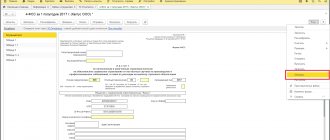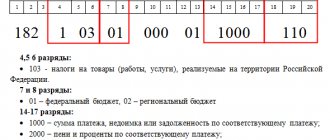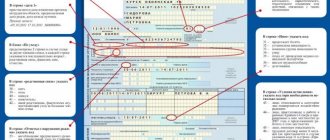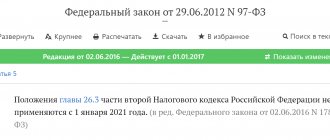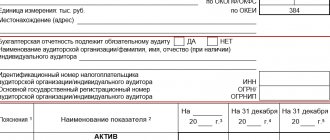Every business entity of any form of ownership and organization of financial processes interacts with supervisory, executive and other government agencies, including the Federal Tax Service. One of the reasons for contacting the tax service is the recording of various changes in the Unified State Register of Legal Entities, which contains data on each company located and operating in Russia.
As the organization goes through different stages of formation and gains stability, there is a need to adjust the information previously added to the Unified State Register of Legal Entities. This could be a change in management or type of activity. Any such facts must be documented in a timely manner by contacting the Federal Tax Service within the time limits established by law.
There are some nuances to such operations.
What amendment applications can be sent via Extern
Through Extern you can send to the Federal Tax Service for free:
- application for amendments to the Unified State Register of Individual Entrepreneurs in form P24001;
- application for amendments to the Unified State Register of Legal Entities in form P14001;
- application for amendments to the constituent documents of the legal entity in form P13001.
Important! You cannot send form P14001 via Extern to change the manager. After all, the form must be signed by the new manager, who cannot obtain an electronic signature for himself while there is no data about him in the Unified State Register of Legal Entities. In this case, submit a paper application to the tax office.
There is no need to pay a state fee when submitting documents through Extern.
The application must be signed electronically by the head of the legal entity or individual entrepreneur.
Response documents from the Federal Tax Service will be sent to Extern, so you don’t have to go to the tax office to get them.
Amendments to the Unified State Register of Legal Entities in 2021
1. GENERAL PROVISIONS
1.1. This Privacy Policy regarding the processing of personal data of users of the site https://www.dvitex.ru/ (hereinafter referred to as the Privacy Policy) was developed and applied by Legal LLC, OGRN 1107746800490, Moscow, per. Golutvinsky 1st, building 3-5, office 4-1 (hereinafter referred to as the Operator) in accordance with paragraphs. 2 hours 1 tbsp. 18.1 of the Federal Law of July 27, 2006 No. 152-FZ “On Personal Data” (hereinafter referred to as the Law on Personal Data).
1.2. This Privacy Policy defines the Operator’s policy regarding the processing of personal data accepted for processing, the procedure and conditions for the processing of personal data of individuals who have transferred their personal data for processing to the Operator (hereinafter referred to as personal data subjects) with and without the use of automation tools, establishes procedures aimed at preventing violations of the legislation of the Russian Federation, eliminating the consequences of such violations related to the processing of personal data.
1.3. The privacy policy was developed to ensure the protection of the rights and freedoms of personal data subjects when processing their personal data, as well as to establish the responsibility of the Operator's officials who have access to the personal data of personal data subjects for failure to comply with the requirements and standards governing the processing of personal data.
1.4. Personal data of the Personal Data Subject is any information relating to a directly or indirectly identified or identifiable individual.
1.5. The Operator processes the following personal data of Users:
- Full Name;
- E-mail address;
- Phone number;
- other data necessary for the Operator when providing services to Users to ensure the functioning of the Site.
1.6. The Operator processes personal data of Personal Data Subjects for the following purposes:
- providing the opportunity for feedback from Operator Specialists on User requests;
- providing the possibility of online payment for services ordered on the Site;
- ensuring the fulfillment of the Operator’s obligations to Users;
- for market research purposes;
- informing the Personal Data Subject about promotions, competitions, special offers, new services, discounts, advertising materials and other services, as well as receiving commercial or advertising information and free products, participating in exhibitions or events, performing marketing research and notification of all special initiatives for clients;
- statistical purposes;
- for other purposes, if the corresponding actions of the Operator do not contradict the current legislation, the activities of the Operator, and the consent of the Personal Data Subject has been obtained for the said processing.
1.7. The operator processes personal data of personal data subjects by performing any action (operation) or set of actions (operations) performed using automation tools or without the use of such means, including the following:
- collection;
- record;
- systematization;
- accumulation;
- storage;
- clarification (update, change);
- extraction;
- usage;
- transmission (distribution, provision, access);
- depersonalization;
- blocking;
- deletion;
- destruction.
2. PRINCIPLES FOR PROCESSING PERSONAL DATA
2.1. When processing personal data, the Operator is guided by the following principles:
- legality and justice;
- confidentiality;
- timeliness and reliability of obtaining the consent of the subject of personal data for the processing of personal data;
- processing only personal data that meets the purposes of their processing;
- compliance of the content and volume of processed personal data with the stated purposes of processing. The personal data processed should not be redundant in relation to the stated purposes of their processing;
- the inadmissibility of combining databases containing personal data, the processing of which is carried out for purposes incompatible with each other;
- storing personal data in a form that allows identifying the subject of personal data for no longer than required for the purposes of processing personal data;
- destruction or depersonalization of personal data to achieve the goals, their processing or in case of loss of the need to achieve these goals.
2.2. The processing of personal data by the Operator is carried out in compliance with the principles and rules provided for:
- Federal Law of July 27, 2006 No. 152-FZ “On Personal Data”;
- This Privacy Policy;
- Universal Declaration of Human Rights 1948;
- International Covenant on Civil and Political Rights 1966;
- European Convention for the Protection of Human Rights and Fundamental Freedoms, 1950;
- The provisions of the Convention of the Commonwealth of Independent States on Human Rights and Fundamental Freedoms (Minsk, 1995), ratified by the Russian Federation on August 11, 1998;
- The provisions of the Okinawa Charter for the Global Information Society, adopted on July 22, 2000;
- Decree of the Government of the Russian Federation dated November 1, 2012 No. 1119 “On approval of requirements for the protection of personal data during their processing in personal data information systems”;
- Order of the FSTEC of Russia dated February 18, 2013 No. 21 “On approval of the composition and content of organizational and technical measures to ensure the security of personal data when processed in personal data information systems”;
- Other regulatory and non-regulatory legal acts governing the processing of personal data.
3. OBTAINING PERSONAL DATA.
3.1. Personal data of personal data subjects is obtained by the Operator:
- by providing the subject with personal data when registering on the Site, when submitting applications, applications, questionnaires, forms, filling out registration forms on the Operator’s website or sending by e-mail, messages by telephone to the Operator’s support service;
- by other means that do not contradict the legislation of the Russian Federation and the requirements of international legislation on the protection of personal data.
3.2. The Operator receives and begins processing the Subject’s personal data from the moment of receiving his consent.
3.3. Consent to the processing of personal data is given by the subject of personal data from the moment of starting to use the site, including by indicating about, through the performance of implied actions by the subject of personal data.
3.4. The subject of personal data may at any time withdraw his consent to the processing of personal data. To revoke consent to the processing of personal data, you must submit a corresponding application to the Operator via available means of communication. At the same time, the Operator must stop processing them or ensure the termination of such processing and, if the preservation of personal data is no longer required for the purposes of their processing, destroy personal data or ensure their destruction within a period not exceeding 30 (Thirty) days from the date of receipt of the specified review .
3.5. If the Personal Data Subject withdraws consent to the processing of personal data, the Operator has the right to continue processing personal data without the consent of the Personal Data Subject only if there are grounds specified in the Personal Data Law.
3.6. The subject of personal data has the right to choose what personal data will be provided to him. However, in case of incomplete provision of the necessary data, the Operator does not guarantee the subject’s ability to use all services and products of the Site, to use all services of the Site.
3.7. The personal data subject can view, update or delete any personal data included in his profile at any time. To do this, he can edit his profile online in his personal account or send an email to
4. PROCESSING PROCEDURE FOR PERSONAL DATA
4.1. The operator takes technical, organizational and legal measures to ensure the protection of personal data from unauthorized or accidental access, destruction, modification, blocking, copying, distribution, as well as from other unlawful actions.
4.2. When processing personal data, the Operator applies legal, organizational and technical measures to ensure the security of personal data in accordance with Art. 19 of the Federal Law “On Personal Data”, Decree of the Government of the Russian Federation dated November 1, 2012 No. 1119 “On approval of requirements for the protection of personal data during their processing in personal data information systems”, Methodology for determining current threats to the security of personal data during their processing in personal information systems data approved by the FSTEC of the Russian Federation on February 14, 2008, Methodological recommendations for ensuring the security of personal data using crypto-means when processing them in personal data information systems using automation tools approved by the FSB of the Russian Federation on February 21, 2008 No. 149/54-144.
4.3. To authorize access to the Site, a Login and Password are used. The subject of personal data is responsible for the safety of this information. The subject of personal data does not have the right to transfer his own Login and Password to third parties, and is also obliged to take measures to ensure their confidentiality.
4.4. When transferring personal data, the Operator complies with the following requirements:
- does not disclose the personal data of the subject of personal data to a third party without expressed consent, except in cases where this is necessary for the purposes of processing personal data, preventing a threat to the life and health of the subject of personal data, as well as in cases established by law;
- does not disclose personal data for commercial purposes without the expressed consent of the subject of personal data;
- informs persons receiving personal data that this data can only be used for the purposes for which it was communicated, and requires these persons to take appropriate measures to protect personal data. Persons receiving the User’s personal data are required to maintain confidentiality;
- allows access to personal data only to authorized persons, and these persons must have the right to receive only those personal data that are necessary to perform specific functions.
4.5. The Operator has the right to disclose any information collected about the User of this Site if disclosure is necessary in connection with an investigation or complaint regarding unlawful use of the Site, or to identify (identify) a User who may violate or interfere with the rights of the Site Administration or the rights of other Site Users, as well as to comply with the provisions of current legislation or court decisions, ensure compliance with the terms of this Agreement, protect the rights or safety of other Users and any third parties.
4.6. Third parties independently determine the list of other persons (their employees) who have direct access to such personal data and (or) process it. The list of these persons, as well as the procedure for access and/or processing of personal data by them, is approved by the internal documents of the Third Party.
4.7. The operator does not sell or provide personal data to third parties for marketing purposes not provided for in this Privacy Policy, without the express consent of the personal data subjects. The operator may combine anonymized data with other information received from third parties and use it to improve and personalize services, content and advertising.
4.8. Processing of personal data is carried out on the territory of the Russian Federation; cross-border transfer of personal data is not carried out. The operator reserves the right to choose any channels for transmitting information about personal data, as well as the content of the transmitted information.
4.9. Personal information collected online is stored by the Operator and/or service providers in databases protected by physical and electronic controls, access control technology and other appropriate security measures.
4.10. The personal data subject understands, confirms and agrees that the technical processing and transmission of information on the Operator’s Website may involve the transfer of data over various networks, including unencrypted communication channels on the Internet, which is never completely confidential and secure.
4.11. The personal data subject also understands that any messages and/or information sent through the Operator’s Server may be unauthorized read and/or intercepted by third parties.
5. FINAL PROVISIONS
5.1. In the event of any disputes or disagreements related to the implementation of these Rules, the Personal Data Subject and the Operator will make every effort to resolve them through negotiations between them. If disputes are not resolved through negotiations, disputes shall be resolved in the manner established by the current legislation of the Russian Federation.
5.2. This Privacy Policy comes into force for the Personal Data Subject from the moment he starts using the Operator’s Website and is valid for an indefinite period.
5.3. This Privacy Policy can be changed and/or supplemented by the Operator at any time during the validity period of the Rules at its discretion without the need to obtain the consent of the Personal Data Subject. All changes and/or additions are posted by the Operator in the appropriate section of the Site and come into force on the day of such posting. The subject of personal data undertakes to promptly and independently familiarize himself with all changes and/or additions. If the Personal Data Subject does not agree with the changes made, he is obliged to refuse access to the Site and stop using the materials and services of the Site.
What is the Unified State Register of Legal Entities and why is it needed? Brief educational program
What is the Unified State Register of Legal Entities? The Unified State Register of Legal Entities (USRLE) is a federal information resource containing general, systematized information about legal entities carrying out business activities on the territory of the Russian Federation.
Who makes entries in the Unified State Register of Legal Entities? In 2021, the register is maintained by the territorial bodies of the Federal Tax Service (FTS). When entered into the Unified State Register of Legal Entities, each entry is assigned a state registration number (SRN).
Why do you need a Unified State Register of Legal Entities? One of the main tasks of the Unified State Register of Legal Entities is to provide the opportunity to obtain up-to-date and reliable information about any legal entity.
Cases in which you will need to submit application P14001
- Change in the composition of the founders or board members of the organization;
- All changes that in one way or another affect the size or number of shares of company participants;
- Change of legal address data;
- Replacement of passport data of those authorized by the rights of the board of the organization;
- Supplementing activities with other types of services or completely replacing them;
- Creation, exception, etc. additional representative offices of the company;
- Clarification of the reliability of the data of the Unified State Register;
- Error detection.
Sometimes, when several of the above cases occur simultaneously, a general application with changes is submitted, for example, when the management and address of the enterprise change. But you cannot combine submitting a request to correct errors and, for example, recording registration information in one form. It is advisable to check with a notary for such examples of generalization of changes.
Procedure
The procedure is quite simple if you follow a certain algorithm:
- at the general meeting of founders a decision on changes is made or it may be the decision of a single participant;
- the decision is documented - a protocol is drawn up;
- documents are prepared according to a specific list, and subsequently they are submitted to the inspectorate for registration;
- an application in the prescribed form is filled out and submitted to the registration authority along with a complete set of documents;
- pick up from the inspection a sheet of changes from the Unified State Register of Legal Entities with new data;
- if necessary, notify other institutions about the adjustments made (for example, a banking institution about a change in the director of the company).
If the documents submitted to the registration authority do not contain errors, then the change sheet can be received within 5 working days. This does not include the day the application was submitted and the day the certificate was received.
What information about a legal entity is contained in the Unified State Register of Legal Entities?
According to the provisions of Part 1 of Art. 5 of the Federal Law “On State Registration of Legal Entities and Individual Entrepreneurs” the Unified State Register of Legal Entities contains the following information about the legal entity:
- Full and abbreviated name;
- Organizational and legal form;
- TIN/KPP of the legal entity;
- Postal address of the legal entity (required);
- Email address of the legal entity (optional);
- Method of creating a legal entity (creation/reorganization);
- The original or a notarized copy of the legal entity’s constituent document (or information that the legal entity operates on the basis of a standard charter);
- Information about the founders (participants) of the legal entity;
- Amount of authorized capital (share capital/authorized fund/share contributions);
- Information about the holder of the register of shareholders (for joint-stock companies);
- Information on the size and nominal value of shares in the authorized capital of the company (for limited liability companies);
- Last name, first name and position of the person who has the right to act on behalf of the legal entity without a power of attorney;
- OKVED codes;
- Information about licenses obtained by a legal entity;
- Information about branches and representative offices of a legal entity;
- Method of termination of a legal entity (liquidation/reorganization/sale, etc.).
Note! Information and documents contained in the Unified State Register of Legal Entities are open and publicly available.
Power of attorney
From May 5, 2014, in connection with the adoption of Law 107-FZ, not only the applicant personally, but also another person representing the applicant, can submit documents for state registration, but for this he needs to issue a power of attorney and confirm it with a notary .
The power of attorney is issued by the Company in the person of the director.
If a copy of the power of attorney is submitted, it must also be certified by a notary.
The same power of attorney will be required when receiving documents if the applicant does not appear for them in person.
What to do when there is a change of manager
It must be remembered that one order or decision of the meeting of founders on the appointment of a new director will not be enough. After completing these documents, the company’s management is obliged to notify the appointment of a new general director within 3 days.
Such information is not subject to inclusion in the statutory documents, but it is part of the Unified State Register of Legal Entities, therefore both government agencies and contractors should be aware of the change in management.
The organization is obliged to notify the tax authorities at its location about the change of management. To do this, an authorized person of the organization submits a corresponding application for changes. The period of three days begins to be calculated from the next day after the decision to appoint a new director is made (the date of the minutes of the meeting of founders).
Information will become available to all interested parties only after the corresponding entry is made in the register.
For late provision of information to the registration authority, an administrative penalty of 5,000 rubles is provided. on an official (clause 3 of article 14.25 of the Code of Administrative Offenses of the Russian Federation).
Deadlines and preparation of documents for entering information into the Unified State Register of Legal Entities
When changes occur in an organization, for example, the addition of OKVED codes, three working days (regulated by Law) from the moment this event is recorded in internal documents (for example, an order), it is necessary to notify the Federal Tax Service about this, following clause 5 of Article 5 of Federal Law 129. That is, provide data to change the information already available in the Unified State Register of Legal Entities.
However, there is a “loophole” that allows you to adjust the deadlines for submitting documents, namely, drawing up, for example, a protocol with an “open date”, which allows you to subsequently enter it by hand, focusing on the appropriate date. This practice can be used in isolated cases, after consulting with lawyers in advance.
Methods for submitting documents
An authorized person can submit an application and a set of documents in several ways:
- by personally contacting the tax office with which the organization is registered (or sending your representative);
- send by mail, documents are sent by registered mail with notification;
- through electronic resources.
Electronic
Many people are attracted to this method of filing, since in this case they will not need to adapt to the working hours of the tax office and stand in line. In addition, this can be done at any time convenient for the applicant.
To do this, you can use the official website of the Federal Tax Service or through the State Services service. The director must have a personal account to fill out the application and attach the necessary documents. You will also need a generated electronic signature, which will allow you to submit your application remotely.
Attached documents must be scanned in a specific format; the services have a hint indicating the technical requirements for the documents.
To obtain an enhanced electronic signature, you need to contact specialized centers.
When signing the transport package, you must make sure that the electronic key is valid, otherwise the inspectors will refuse to accept the documents.
After receiving the transport container, the inspector will accept the documents and send a receipt for their acceptance.

